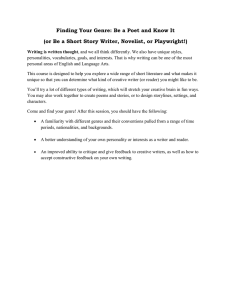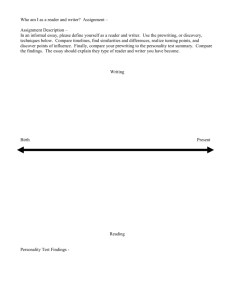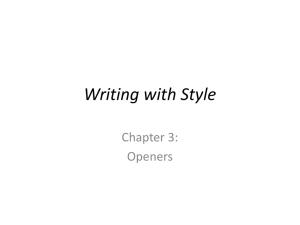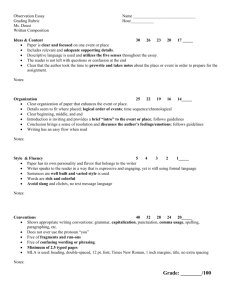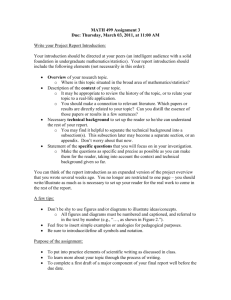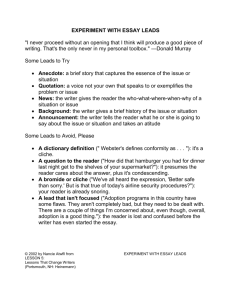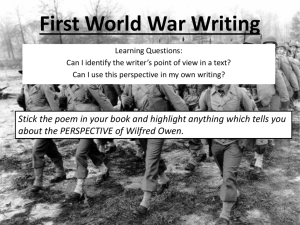The Portable Editor
advertisement
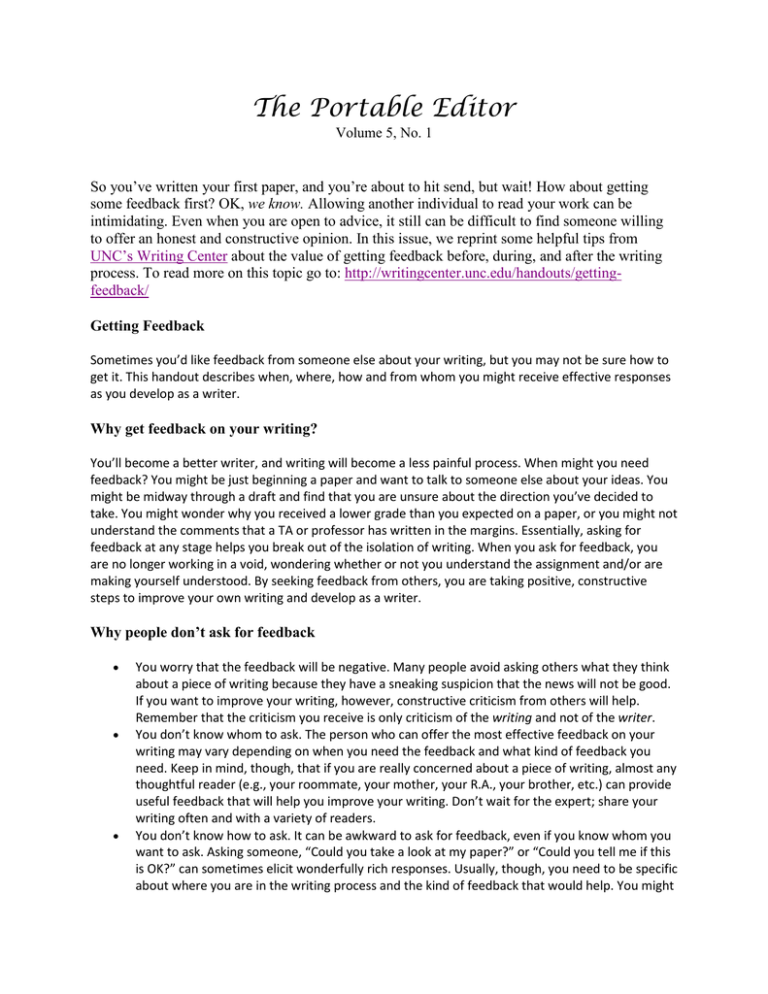
The Portable Editor Volume 5, No. 1 So you’ve written your first paper, and you’re about to hit send, but wait! How about getting some feedback first? OK, we know. Allowing another individual to read your work can be intimidating. Even when you are open to advice, it still can be difficult to find someone willing to offer an honest and constructive opinion. In this issue, we reprint some helpful tips from UNC’s Writing Center about the value of getting feedback before, during, and after the writing process. To read more on this topic go to: http://writingcenter.unc.edu/handouts/gettingfeedback/ Getting Feedback Sometimes you’d like feedback from someone else about your writing, but you may not be sure how to get it. This handout describes when, where, how and from whom you might receive effective responses as you develop as a writer. Why get feedback on your writing? You’ll become a better writer, and writing will become a less painful process. When might you need feedback? You might be just beginning a paper and want to talk to someone else about your ideas. You might be midway through a draft and find that you are unsure about the direction you’ve decided to take. You might wonder why you received a lower grade than you expected on a paper, or you might not understand the comments that a TA or professor has written in the margins. Essentially, asking for feedback at any stage helps you break out of the isolation of writing. When you ask for feedback, you are no longer working in a void, wondering whether or not you understand the assignment and/or are making yourself understood. By seeking feedback from others, you are taking positive, constructive steps to improve your own writing and develop as a writer. Why people don’t ask for feedback • • • You worry that the feedback will be negative. Many people avoid asking others what they think about a piece of writing because they have a sneaking suspicion that the news will not be good. If you want to improve your writing, however, constructive criticism from others will help. Remember that the criticism you receive is only criticism of the writing and not of the writer. You don’t know whom to ask. The person who can offer the most effective feedback on your writing may vary depending on when you need the feedback and what kind of feedback you need. Keep in mind, though, that if you are really concerned about a piece of writing, almost any thoughtful reader (e.g., your roommate, your mother, your R.A., your brother, etc.) can provide useful feedback that will help you improve your writing. Don’t wait for the expert; share your writing often and with a variety of readers. You don’t know how to ask. It can be awkward to ask for feedback, even if you know whom you want to ask. Asking someone, “Could you take a look at my paper?” or “Could you tell me if this is OK?” can sometimes elicit wonderfully rich responses. Usually, though, you need to be specific about where you are in the writing process and the kind of feedback that would help. You might • • say, “I’m really struggling with the organization of this paper. Could you read these paragraphs and see if the ideas seem to be in the right order?” You don’t want to take up your teacher’s time. You may be hesitant to go to your professor or TA to talk about your writing because you don’t want to bother him or her. The office hours that these busy people set aside, though, are reserved for your benefit, because the teachers on this campus want to communicate with students about their ideas and their work. Faculty can be especially generous and helpful with their advice when you drop by their office with specific questions and know the kinds of help you need. If you can’t meet during the instructor’s office hours, try making a special appointment. If you find that you aren’t able to schedule a time to talk with your instructor, remember that there are plenty of other people around you who can offer feedback. You’ve gotten feedback in the past that was unhelpful. If earlier experiences haven’t proved satisfactory, try again. Ask a different person, or ask for feedback in a new way. Experiment with asking for feedback at different stages in the writing process: when you are just beginning an assignment, when you have a draft, or when you think you are finished. Figure out when you benefit from feedback the most, the kinds of people you get the best feedback from, the kinds of feedback you need, and the ways to ask for that feedback effectively. Possible writing moments for feedback There is no “best time” to get feedback on a piece of writing. In fact, it is often helpful to ask for feedback at several different stages of a writing project. Listed below are some parts of the writing process and some kinds of feedback you might need in each. Keep in mind, though, that every writer is different—you might think about these issues at other stages of the writing process, and that’s fine. • • • • • • The beginning/idea stage: Do I understand the assignment? Am I gathering the right kinds of information to answer this question? Are my strategies for approaching this assignment effective ones? How can I discover the best way to develop my early ideas into a feasible draft? Outline/thesis: I have an idea about what I want to argue, but I’m not sure if it is an appropriate or complete response to this assignment. Is the way I’m planning to organize my ideas working? Does it look like I’m covering all the bases? Do I have a clear main point? Do I know what I want to say to the reader? Rough draft: Does my paper make sense, and is it interesting? Have I proven my thesis statement? Is the evidence I’m using convincing? Is it explained clearly? Have I given the reader enough information? Does the information seem to be in the right order? What can I say in my introduction and conclusion? Early polished draft: Are the transitions between my ideas smooth and effective? Do my sentences make sense individually? How’s my writing style? Late or final polished draft: Are there any noticeable spelling or grammar errors? Are my margins, footnotes, and formatting okay? Does the paper seem effective? Is there anything I should change at the last minute? After the fact: How should I interpret the comments on my paper? Why did I receive the grade I did? What else might I have done to strengthen this paper? What can I learn as a writer about this writing experience? What should I do the next time I have to write a paper? Kinds of feedback to ask for Asking for a specific kind of feedback can be the best way to get advice that you can use. Think about what kinds of topics you want to discuss and what kinds of questions you want to ask: • • • • • • • • Understanding the assignment (Do I understand the task? How long should it be? What kinds of sources should I be using? Do I have to answer all of the questions on the assignment sheet or are they just prompts to get me thinking? Are some parts of the assignment more important than other parts?) Factual content (Is my understanding of the course material accurate? Where else could I look for more information?) Interpretation/analysis (Do I have a point? Does my argument make sense? Is it logical and consistent? Is it supported by sufficient evidence?) Organization (Are my ideas in a useful order? Does the reader need to know anything else up front? Is there another way to consider ordering this information?) “Flow” (Do I have good transitions? Does the introduction prepare the reader for what comes later? Do my topic sentences accurately reflect the content of my paragraphs? Can the reader follow me?) Style (Comments on earlier papers can help you identify writing style issues that you might want to look out for. Is my writing style appealing? Do I use the passive voice too often? Are there too many “to be” verbs?) Grammar (Just as with style, comments on earlier papers will help you identify grammatical “trouble spots.” Am I using commas correctly? Do I have problems with subject-verb agreement?) Small errors (Is everything spelled right? Are there any typos?) Possible sources of feedback and what they’re good for A classmate (a familiar and knowledgeable reader) When you need feedback from another person, a classmate can be an excellent source. A classmate knows the course material and can help you make sure you understand the course content. A classmate is probably also familiar with the sources that are available for the class and the specific assignment. Moreover, you and your classmates can get together and talk about the kinds of feedback you both received on earlier work for the class, building your knowledge base about what the instructor is looking for in writing assignments. Your roommate/friend/family member (an interested but not familiar reader) It can be very helpful to get feedback from someone who doesn’t know anything about your paper topic. These readers, because they are unfamiliar with the subject matter, often ask questions that help you realize what you need to explain further or that push you to think about the topic in new ways. They can also offer helpful general writing advice, letting you know if your paper is clear or your argument seems well organized, for example. Ask them to read your paper and then summarize for you what they think its main points are. Need Writing Assistance??? Contact Diane or Susan at soswwritingsupport@gmail.com
